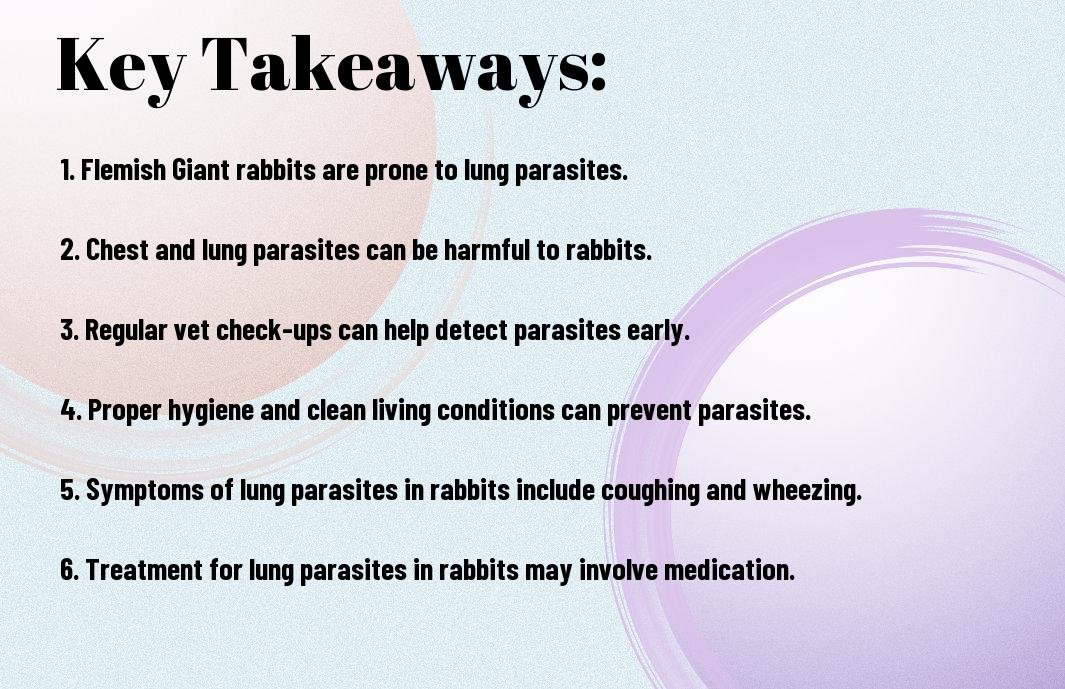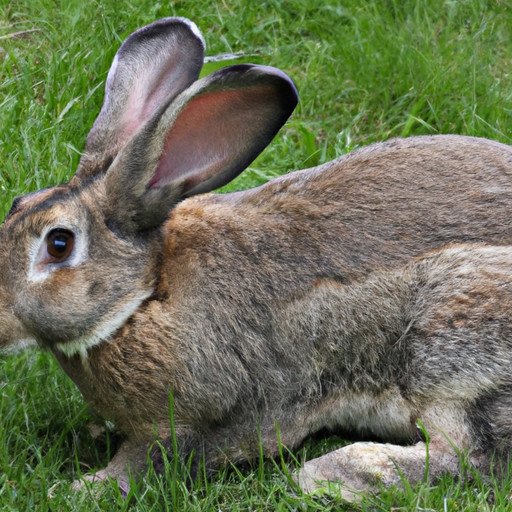Have you ever wondered if Flemish Giant rabbits are more susceptible to chest lung parasites than other breeds? It’s important to understand the potential risks and preventive measures for keeping your beloved pet healthy. In this informative blog post, we will explore the likelihood of Flemish Giant rabbits contracting chest lung parasites, the symptoms to watch out for, and the best practices for keeping your rabbit safe and healthy.
Key Takeaways:
- Flemish Giant rabbits are known to be prone to chest lung parasites.
- These parasites can cause respiratory issues and compromise the rabbit’s health.
- Regular veterinary check-ups and monitoring for any symptoms are crucial for early detection and treatment.
- Providing a clean and hygienic environment for the rabbit can help in preventing parasite infestations.
- Proper diet and nutrition can also strengthen the rabbit’s immune system and reduce the risk of chest lung parasites.

Understanding Chest Lung Parasites
While the term “chest lung parasites” may sound alarming, it’s essential to have a good understanding of what they are and how they can affect your Flemish Giant rabbit. These parasites can cause serious health issues for your pet, so it’s crucial to be aware of the potential risks and symptoms.
Defining Chest Lung Parasites
Chest lung parasites, also known as respiratory parasites, are small organisms that can infect the respiratory tract of your rabbit. These parasites can include lungworms, mites, and other microscopic organisms that can cause irritation, inflammation, and blockages within the airways and lungs.
Symptoms of Chest Lung Parasites in Rabbits
If your Flemish Giant rabbit is suffering from chest lung parasites, you may notice symptoms such as coughing, wheezing, labored breathing, decreased appetite, weight loss, and lethargy. These parasites can significantly impact the overall health and well-being of your rabbit, and if left untreated, they can lead to more severe respiratory issues and even life-threatening complications. It’s essential to be vigilant and seek immediate veterinary care if you suspect your rabbit may be affected by chest lung parasites.
Chest Lung Parasites in Flemish Giant Rabbits
Now, let’s discuss the susceptibility of Flemish Giant rabbits to chest lung parasites. Chest lung parasites are a common concern in rabbits, causing symptoms such as coughing, difficulty breathing, and lethargy. It’s important to be aware of the potential risk of these parasites in Flemish Giant rabbits and how to prevent and treat them.
Research Findings on Parasite Prone Breeds
Research has shown that certain rabbit breeds may be more prone to chest lung parasites than others. Specifically, breeds with larger body sizes and longer fur may be at a higher risk. This is due to the fact that larger rabbits have a greater lung surface area, providing more space for parasites to thrive. Additionally, the longer fur can trap moisture and dirt, creating an ideal environment for parasites to multiply. It’s crucial to consider these factors when evaluating the risk of chest lung parasites in your Flemish Giant rabbit.
Flemish Giant Rabbits and Chest Lung Parasites
When it comes to Flemish Giant rabbits, their large size and dense fur make them particularly vulnerable to chest lung parasites. The size of their lungs and body can create an environment conducive to these parasites, increasing the likelihood of infestation. Additionally, the dense fur of Flemish Giants can make it challenging to detect early signs of parasites, leading to delayed treatment. It’s essential to be vigilant and proactive in monitoring your Flemish Giant rabbit for any signs of chest lung parasites.
Prevention and Treatment
To ensure the well-being of your Flemish Giant rabbit and minimize the risk of chest lung parasites, there are several prevention and treatment measures that you can take. By being proactive and vigilant, you can help keep your rabbit healthy and happy.
How to Detect Chest Lung Parasites in Flemish Giant Rabbits
One of the primary ways to detect chest lung parasites in your Flemish Giant rabbit is to monitor their behavior and physical condition. Keep an eye out for symptoms such as coughing, wheezing, difficulty breathing, and a decreased appetite. If you notice any of these signs, it is essential to seek veterinary care immediately. Regular check-ups with a rabbit-savvy veterinarian can also help detect any potential health concerns early on, including chest lung parasites.
Approaches for Treatment and Prevention
If your Flemish Giant rabbit is diagnosed with chest lung parasites, your veterinarian will prescribe an appropriate treatment plan, which may include medication to eliminate the parasites and alleviate any related symptoms. Additionally, preventative measures such as providing a clean living environment, implementing a balanced diet, and minimizing stress can help reduce the risk of chest lung parasites. Regular cleaning of your rabbit’s living quarters and maintaining good hygiene practices can also play a significant role in preventing the occurrence of these parasites.
Are Flemish Giant Rabbits Prone To Chest Lung Parasites?
With this in mind, it is important to regularly monitor the health of your Flemish Giant rabbit and be aware of the symptoms of chest lung parasites. Keeping their living environment clean, ensuring proper ventilation, and providing a balanced diet can help reduce the risk of infection. It is also essential to consult with a veterinarian for regular check-ups and to address any concerns about your rabbit’s health. By taking proactive measures, you can help protect your Flemish Giant rabbit from chest lung parasites and ensure their overall well-being.
FAQ
Q: Are Flemish Giant Rabbits Prone To Chest Lung Parasites?
A: Yes, Flemish Giant rabbits are prone to chest lung parasites. These parasites, such as lungworms and respiratory worms, can affect their respiratory system and cause serious health issues if not treated promptly.
Q: What are the symptoms of chest lung parasites in Flemish Giant rabbits?
A: Symptoms of chest lung parasites in Flemish Giant rabbits may include difficulty breathing, coughing, wheezing, lethargy, lack of appetite, and weight loss. It’s important to monitor your rabbit’s behavior and seek veterinary attention if any of these symptoms are observed.
Q: How can I prevent chest lung parasites in my Flemish Giant rabbit?
A: To prevent chest lung parasites, it’s important to keep your rabbit’s living area clean and dry. Regularly clean and disinfect their cage, provide fresh hay and water, and monitor their overall health. Additionally, consult with your veterinarian about preventive measures, such as regular deworming, to help protect your rabbit from chest lung parasites.
